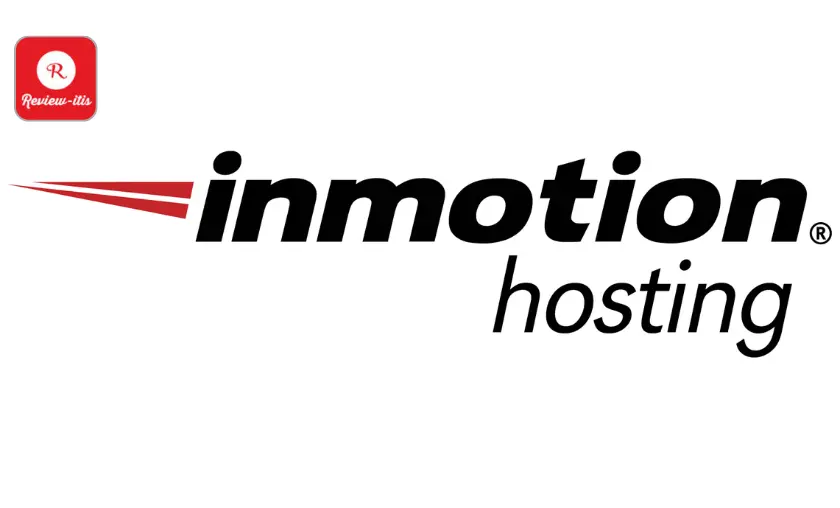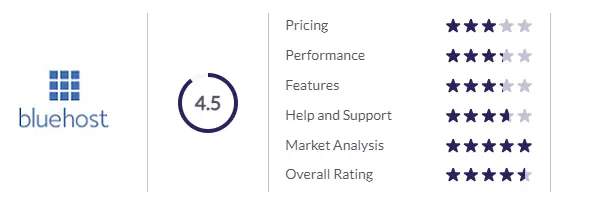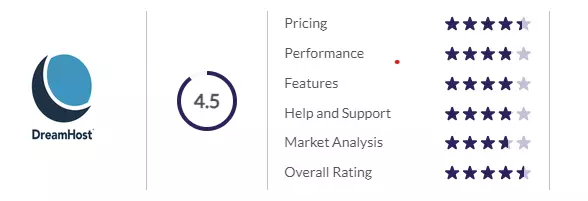Embark on your hosting journey today as we unveil the seven fundamental disparities between shared and VPS hosting.
The hosting realm can seem daunting, especially if you need to be better versed in technical intricacies. Understanding the concept of hosting, let alone differentiating between its various types, can be pretty challenging!
But fret not, as we are here to dispel all your apprehensions. At Website Builder Expert, we have garnered ample experience and acquired a wealth of knowledge in web hosting.
Not only that, but we have also conducted our meticulous research to assist you in selecting the perfect hosting provider tailored to your specific requirements. However, let’s begin with the fundamentals.
Hosting comes in many forms, but our primary focus will be on two: shared hosting and virtual private server (VPS) hosting.
What is Shared Hosting?
Shared hosting entails sharing a server, along with all its resources, among multiple websites. This encompasses bandwidth, storage, and everything in between.
What is VPS Hosting?
VPS hosting crafts a virtual atmosphere that mirrors a dedicated server, where you exclusively enjoy all the server’s resources. However, this occurs within the framework of a shared hosting environment.
In the following discourse, we will delve into each hosting type’s prominent advantages and disadvantages and present you with the leading providers for both shared hosting and VPS hosting. Furthermore, we will navigate through crucial aspects to consider, analyze the key disparities, and ultimately determine the hosting type that perfectly aligns with your needs: shared hosting or VPS hosting.
Table of Contents
Shared Hosting vs VPS Hosting Comparison
| Key Differences | Shared Hosting | VPS Hosting |
|---|---|---|
| Resource Allocation Winner: VPS Hosting | Embrace resource sharing with fellow websites on your server; if one hits the limit, the rest will too. | Retain control over your website’s limits while still participating in resource sharing with others. |
| Security Winner: VPS Hosting | While generally offering security, there’s a risk factor if one site on your server falls victim to hacking, jeopardizing you as well. | Take charge of your website’s security by installing personal security software, guaranteeing your protection independent of the security status of others on your server. |
| Performance Winner: VPS Hosting | Experience commendable uptime and ample bandwidth to accommodate hundreds of weekly visitors, granted that other sites don’t excessively consume resources. | Enjoy swift page loading speeds and an abundance of bandwidth capable of accommodating thousands of visitors on a weekly basis. |
| Set Up & Customization Winner: VPS Hosting | Exercise control over your resource allocation with limited customization options, allowing you to set specific limits according to your needs. | Gain enhanced command over your resource limits, enabling customization possibilities by integrating additional software. |
| Scalability Winner: VPS Hosting | Limited scalability beyond static websites is a constraint to consider. | Designed to accommodate the growth of your website, scaling seamlessly to cater even to colossal corporate sites. |
| Pricing Winner: Shared Hosting | Economically positioned as the most affordable hosting option available in the market. | It is priced at a higher level than shared hosting, reflecting its enhanced features and capabilities. |
An alternative perspective to grasp the distinction is likening it to renting property.
Shared hosting resembles renting a room in a shared house, where you occupy a small space within a larger communal area. It is the most budget-friendly hosting option, although it can occasionally become cramped.
VPS hosting, on the other hand, grants you more than just a single slice of a server. It’s comparable to renting an apartment in a building block, offering more rooms, space, flexibility, and a slightly higher price tag. While you enjoy greater control, you still operate within a shared server environment.
Shared hosting is typically suitable for static websites with fixed content, like resume sites. Dynamic sites, like multilingual websites or e-commerce stores that require a versatile range based on user location or cookies, are better served by VPS hosting.
Shared hosting is ideal for primary personal sites like blogs and startups. While it may lack advanced features, top-notch security, and ultra-fast loading speeds, such comprehensive functionality is optional.
On the other hand, VPS hosting presents a step up and is well-suited for small businesses, online stores, and more significant personal sites. You can expect a considerable boost in features, security, and performance by investing a reasonable amount.
VPS hosting also proves beneficial if you have plans to expand your site. Consider it an investment and select a program that aligns with your long-term ambitions rather than solely focusing on immediate needs.
Shared Hosting vs VPS Hosting: Pros and Cons
Although shared hosting is the most affordable option, VPS hosting can provide excellent value for your investment. The key lies in determining the type of hosting that suits your needs. For beginner and personal websites, shared hosting generally offers excellent features. However, if you’re establishing an online store or anticipate outgrowing the introductory provisions, upgrading to the scalable and tailored offerings of VPS hosting becomes the prudent choice.
Shared Hosting Pros & Cons
Pros
- The cheapest type of hosting
- Designed for beginners and tech novices
- Decent performance on static and low-traffic websites
Cons
- No dedicated resources
- Higher security risks
- Sites you share a server with will affect your performance.
VPS Hosting Pros & Cons
Pros
- Great value for money
- More customizable control
- Scalable plans that grow with your website
Cons
- Slightly more expensive than shared hosting
- Requires basic technical knowledge
- You’ll need a vague idea of how much storage and bandwidth you want.
Resource Allocation
VPS hosting offers more resources
VPS hosting grants you a greater allocation of resources than shared hosting, as more hardware translates to more available resources. This means you can focus on more important tasks without constantly worrying about the impact of other websites on your performance. With shared hosting, your dependence on neighboring sites can hinder your progress.
Resource allocation is a universal necessity. Like your mobile plan sets limits on calls, texts, and data, hosting operates similarly, with resources such as storage space and memory in play.
As the name implies, shared hosting involves resource sharing among websites on the same server. If one site consumes excessive bandwidth, it adversely affects the performance of all other sites. It’s akin to wanting to cook in a communal kitchen when all the burners are already occupied.
VPS hosting, on the other hand, comes with minimal limitations. You enjoy more resources by possessing more of the server’s hardware. Additionally, you gain root access to the server environment, enabling the installation of extra software and the ability to edit any file.
HostGator, our top recommendation for shared hosting, with an impressive overall score of 4.7 out of 5, offers unlimited storage and bandwidth across its shared hosting plans. However, it’s crucial to remember that it is still a shared environment. Bluehost, our preferred VPS hosting provider with an overall score of 4.6 out of 5, also provides ample storage and bandwidth allowances in its plans, up to 8GB of RAM, and complete root access.

Don’t Want To Be Limited by Your Hosting Plan?
Bluehost’s VPS plans offer many advantages, including unlimited bandwidth, full root access, dedicated RAM, CPU, and robust storage power.
Security
VPS hosting will keep your website secure
Regarding security, VPS hosting grants you more control than shared hosting while receiving enhanced security features from your provider. If your website processes users’ data, we strongly advise steering clear of shared hosting.
Let’s start by acknowledging that, in general, shared hosting is safe. Providers invest considerable effort into securing their systems, but there are no guarantees. Once again, this vulnerability stems from sharing a server with other sites.
If one site on the server experiences a security breach due to a mistake, it risks every site. You may lock your bedroom, but your safety is compromised if one of your housemates leaves the front door open.
On the other hand, VPS hosting offers a higher level of security. Firstly, you share the server with other VPS users, ensuring everyone benefits from an elevated level of security. Additionally, you have more control over your protection, like installing CCTV and alarms in your apartment. Even if someone neglects to close the entrance to your building, there’s no need to panic.
While HostGator’s shared hosting provides valuable security features, such as a free SSL certificate, they need to catch up to the protection offered by VPS hosting. For instance, InMotion’s VPS plans include a free SSL certificate and additional SSH and DDoS protection measures.

Want To Keep Your Website Secure?
InMotion’s VPS plans have valuable security features, including a complimentary SSL certificate. This essential addition ensures your website remains safeguarded against potential threats. Moreover, our research consistently yields high scores for the security measures implemented by InMotion.
Performance
VPS hosting outperforms shared hosting
VPS hosting generally offers greater bandwidth and is better equipped to handle sudden traffic spikes. Shared hosting suffices for small sites with modest visitor volumes, but caution should be exercised regarding the impact of a sudden surge in popularity on performance.
While having abundant resources and robust security is crucial, what truly matters to your visitors is the seamless operation of your site. Factors like bandwidth availability may vary across different plans, and uptime relies on the chosen provider’s performance.
Research indicates that nearly half of all internet users expect web pages to load within two seconds or less. Keeping this in mind, selecting a plan that can handle substantial waves of traffic without compromising loading speeds is essential.
Shared hosting providers like DreamHost excel in our site speed and uptime tests, ranking as our second-best hosting provider for site speed with a commendable score of 3.8 out of 5 for shared hosting performance.
In our site speed and uptime testing, InMotion didn’t perform as strongly, but its VPS hosting plans received an impressive performance score of 3.7 out of 5. These VPS plans offer generous allocations of storage space, RAM, and cores, all of which play vital roles in ensuring the smooth functioning of your site.

Want a Reliable Hosting Provider?
Among our top three VPS hosting providers, InMotion takes the lead in performance. Its most robust VPS plan boasts impressive specifications, including 8 Cores, 16GB RAM, 360GB storage, and unlimited bandwidth.
Set Up & Customization
VPS hosting beats shared hosting for customization
Regarding setup and customization, VPS hosting offers a superior choice, especially with the availability of Managed plans. With Managed VPS hosting, you can skip the hassle of setting up everything while enjoying increased flexibility. On the other hand, shared hosting follows a more rigid structure.
The hosting configuration and setup process is typically handled by your provider on shared hosting plans, freeing you up to focus on more critical tasks.
VPS hosting, however, introduces a bit more complexity. There are two types of VPS hosting: Managed and Unmanaged. Managed plans mirror shared hosting regarding setup, where the provider handles the process. On the other hand, unmanaged plans put the responsibility in your hands, although developers and experts usually prefer these.
Customization is where the clear distinction lies between these hosting types. To illustrate, consider your mobile plan. While shared hosting has predefined limits you cannot surpass, such as call minutes and data usage, VPS hosting allows you to customize your project and adjust your limits every month.
Moreover, VPS hosting providers like Bluehost empower users to manage their websites through a unified dashboard and provide full root access. While most hosting providers offer excellent help and support services, HostGator is our top choice, earning a stellar score of 5 out of 5 for overall support.

Do You Need To Get Online Quickly?
While HostGator ranks as our second-best choice for VPS hosting, it takes the top spot as our number-one provider for help and support. So, if you encounter any challenges while managing your website, HostGator will offer a helping hand.
Scalability
VPS hosting wins for scalability
Shared hosting offers its advantages and suits the needs of personal sites or small startups. However, VPS hosting is the ideal solution if you have ambitions to scale your website without worrying about it crashing.
When comparing shared hosting and VPS hosting, it’s crucial to consider your ambitions. Shared hosting is a perfect fit if you run a small website with a modest number of weekly visitors and plan on something other than significant scaling.
The real challenges arise as your website grows. When your visitor count transitions from hundreds to thousands, your once-pleasant homepage can quickly become an error message.
This is where VPS hosting shines. It can seamlessly grow with you. Investing a few extra bucks each month at this stage provides the necessary breathing room for small businesses. While living in a shared house may be fine when it’s just you, things can quickly become cramped once you have a partner.

Are You Expecting To Grow Online?
Bluehost’s VPS plans offer a gradual price increase as you scale, allowing ample room for expansion without significantly damaging your budget.
Pricing
Shared hosting beats VPS hosting on price
Absolutely! If your primary concern is hosting your website on a tight budget, shared hosting unquestionably offers a more affordable option than VPS hosting. However, it’s crucial to recognize that shared hosting may have limitations for websites with ambitious goals.
Now that we’ve covered the technical aspects, let’s address the pressing question: how much will this cost?
First and foremost, both shared and VPS hosting comes with various pricing tiers. Naturally, the more expensive plan you choose, the more features and tools (as mentioned above) you’ll have access to, including resources, security, and performance enhancements.
Secondly, it’s worth noting that the providers mentioned in our table offer promotional prices. These discounted initial sign-up rates remain valid for the first few months or years of your plan. HostGator, for instance, offers introductory discounts of up to 65% off on shared goals, while Bluehost’s VPS plans start at $19.99/month with a 36-month contract.
Considering these considerations, the prices listed below focus exclusively on 12-month subscriptions, ensuring a fair comparison of hosting types and providers.
| Provider | Shared Hosting | VPS Hosting |
|---|---|---|
| HostGator | $2.75–$5.25/month | $23.95–$59.95/month |
| Bluehost | $2.95–$13.95/month | $29.99–$69.99/month |
| InMotion | $2.29–$12.99/month | $14.99–$44.99/month |
| DreamHost | $2.59-$3.95/month | $10.00–$80.00/month |
DreamHost offers the most affordable shared hosting plans among our top hosting providers, earning an impressive price score of 4.4 out of 5 in our shared hosting research. On the other hand, Bluehost emerges as the cost-effective option for VPS hosting, boasting the highest overall price rating of 3.9 out of 5 in our VPS hosting research.
As you can observe, shared hosting comes at a lower cost than VPS hosting. It is an excellent choice for personal websites and startup businesses seeking an online presence. If you’re still exploring the best way to create a website, look at our website builder comparison chart.
Website builders are online platforms that assist you in building a website without the need for coding skills. They come at a similar cost to shared hosting plans but include additional features such as website design, domain registration, and hosting. Website builders offer a comprehensive solution that simplifies the website creation process.

Looking for an Affordable Hosting Provider?
DreamHost’s shared hosting plans start at $2.59/month for 12 months, making it an affordable choice compared to VPS hosting.
Shared Hosting vs VPS Hosting: Top Providers
Our research sets us apart from other websites, and we take great pride in it. We’ve extensively reviewed numerous hosting providers, thoroughly testing their features, analyzing their help and support, and assessing their value for money.
Given the diverse needs that different types of hosting cater to, we have researched and evaluated each provider across various hosting types. Now, the burning question is: who emerges as the winner?
Top 3 Shared Hosting Providers

Is HostGator The Right Fit For You?
In our testing, HostGator is our top pick for shared hosting, with an impressive score of 4.7 out of 5. Its affordable plans come packed with unlimited bandwidth and storage, ensuring your site runs seamlessly.
HostGator

When it comes to shared hosting, HostGator emerges as our top choice. Their plans come packed with various features, including unlimited storage and bandwidth, one-click WordPress installations, free website transfers, an SSL certificate, and a free domain. Additionally, you’ll benefit from automated backups and unlimited email accounts, making it an all-inclusive hosting solution.
Bluehost

Securing the second spot is Bluehost, achieving a solid score of 4.5 out of 5 in our shared hosting research. Bluehost offers a range of four plans, each with its own set of valuable upgrades. Starting from the Plus plan, users can access unlimited websites, a free domain, and a free SSL certificate. However, if you’re seeking automated backups and multi-site management tools, you’ll need to opt for the Choice Plus plan, which comes at an additional cost.
DreamHost

DreamHost checks off all the essential features you need. You’re in good hands with its custom-built control panel, automated daily backups, and unmetered bandwidth. But that’s not all – DreamHost goes the extra mile by providing 24/7 ticket support, live chat assistance, a free SSL certificate, and seamless automated WordPress migrations. If you opt for the Shared Unlimited plan, you’ll even enjoy the perks of unlimited websites and email accounts.
Top 3 VPS Hosting Providers

Is Bluehost The Right Fit For You?
Bluehost takes the lead as our top choice regarding VPS hosting, earning an impressive score of 4.6 out of 5 in our thorough testing. With Bluehost, you can expect many features across its plans, including the bonus of a free IP address and the flexibility of hosting unlimited domains. And the best part? All of this comes at an affordable price point.
Bluehost

Bluehost takes the crown in our VPS hosting research, securing an impressive score of 4.6 out of 5. With its affordable plans, you can enjoy unlimited bandwidth and up to 120GB of storage space, surpassing other providers in value. Not to mention, Bluehost also offers a free IP address and the flexibility to host unlimited domains, making it an unbeatable choice for VPS hosting.
HostGator

HostGator stands out in the realm of VPS hosting with its impressive plans. Their features are designed to meet your needs, offering a range of 2-8GB of RAM (Random Access Memory), full root access, two cores, up to 240GB of storage, and unmetered bandwidth. Additionally, you can rely on HostGator for weekly backups and round-the-clock support, ensuring your website remains secure, and assistance is readily available.
InMotion

InMotion, although it has slipped from its previous position, remains a strong contender in the world of hosting. While it now secures a spot in our top three for VPS hosting with a score of 4.4 out of 5, it continues to deliver notable features. With plans offering up to 360GB of storage, a complimentary SSL certificate, and robust security measures, InMotion ensures your website remains protected. Remember that unlimited bandwidth is exclusively available with the 8GB RAM plan or higher.
Shared Hosting vs VPS Hosting: Conclusion
By now, you should have gained a solid understanding of shared hosting and VPS hosting, along with their fundamental distinctions. Additionally, you now have the knowledge to determine which hosting option aligns best with your website’s requirements.
To recap, let’s quickly revisit the key points we’ve covered, summarizing the disparities between shared hosting and VPS hosting:
| Key Differences | Shared Hosting | VPS Hosting |
|---|---|---|
| Resource Allocation Winner: VPS Hosting | Collaborate and share resources with other websites on your server. When one hits the limit, the others may run out too. | While resources are still shared, you now hold more control over your website’s limits. |
| Security Winner: VPS Hosting | Experience a high level of security overall, but be mindful that if a single site on your server falls victim to hacking, your website becomes susceptible to risk. | Ensure your protection by installing personal security software, even if others on your server aren’t. |
| Performance Winner: VPS Hosting | Enjoy reliable uptime and sufficient bandwidth to accommodate hundreds of weekly visitors, as long as other sites don’t excessively consume resources. | Experience exceptional page loading speeds and ample bandwidth to effortlessly accommodate thousands of visitors every week. |
| Set Up & Customization Winner: VPS Hosting | Take control of your resource allocation with the ability to set limits, although customization options may be limited. | Gain greater control over your resource limits and unleash the potential for customization by incorporating additional software. |
| Scalability Winner: VPS Hosting | Scaling beyond static websites may present challenges, as the system’s scalability is limited. | Experience remarkable scalability that aligns with the growth of your website, seamlessly accommodating even the most expansive corporate sites. |
| Pricing Winner: Shared Hosting | Discover the most budget-friendly hosting option available. | Pricier than shared hosting but worth the investment. |
For personal sites and startups, shared hosting is the ideal choice. However, VPS hosting is the clear winner if you have a dynamic, more significant place or a small business. While VPS hosting comes at a higher cost than shared hosting, it offers greater flexibility in resource limits, enhanced security, and improved performance. Nevertheless, shared hosting is perfectly suitable for beginners, and performance should not be a significant concern.
If shared hosting aligns with your needs, we recommend considering HostGator, Bluehost, and DreamHost. Similarly, if you require more advanced VPS hosting, look closely at Bluehost, HostGator, or InMotion.
For More amazing articles related to Web Hosting Comparison Check out our website Over Here
To Read more similar articles click here
Thanks for visiting our Website. If you appreciate our work, kindly show us some support in our comments section 🙂